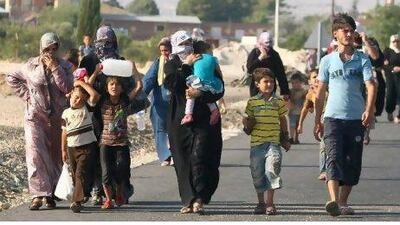ABU DHABI // For the UAE's 160,000 Syrians, the past 17 months have been tough.
Whenever the violence in their home country escalates, the phones are cut off and they can do little but wait for word of their family, and hope.
In many cases their relatives are struggling for money, with the exchange shops in many areas closed for months at time.
They do open sometimes. Al Ansari Exchange said some offices it worked with in Syria had reopened last Wednesday. However, it was unable to say whether this would be permanent, and offices in some areas - including Deir Ezzour - remain closed.
"Leaving our families to go through all this alone is bad, but not knowing what has happened to them is worse," said Zahra. "And then we cannot send money."
Helping through fundraising has been out of the question for many, as they fear taking part in such activities would identify them and make their families back home possible victims of the regime.
BR, a Syrian in Al Ain, has been warned by his parents to be wary even of other Syrians in the UAE.
"If we cannot verify their family name and have a connection with them of some sort, then we don't speak to them," he said. "We just stay away from each other."
For many, donating quietly to aid organisations, whether private or government-linked, has been a better option.
Ahmed Al Mazrouie, chairman of the UAE Red Crescent, said it had sent "a very big figure, millions".
"We started from when people started fleeing and becoming refugees, we have been working for a long time," he said. "There are more than 200,000 refugees, in Lebanon, Turkey, and Jordan - for sure they need much more support."
But things are going well, he said. The Red Crescent in Jordan had been fully supportive, and a Red Crescent-backed mobile hospital started operating on August 28. In its first week, it saw more than 900 patients.
He has previously called on other organisations to help with aid efforts.
The plan now is to build caravans for 2,700 refugees on donated land. "These will not be tents, but caravans with kitchens, all secure with security, cleaning, clinics, and mosques," he said.
"We are grateful for the help the UAE has so far provided to Syrian refugees," said Samiha Saleh, a Syrian who lives in Dubai.
"We are so grateful they have been welcoming to us. We need countries, like the UAE, to keep supporting us."
Sheikh Abdullah bin Zayed, the Foreign Minister, called in a speech last week for the international community to impose sanctions on the Syrian regime.
"What would work out in Syria's interest at present is to achieve a transition to a new government, and international sanctions are surely the best option to weaken the current regime," he said.
"The Arab League had been at the forefront of agencies that imposed sanctions on the Syrian regime, but failure to reach an international resolution at the UN Security Council regarding Syria hampers effective international action."
* All Syrians' names have been changed

